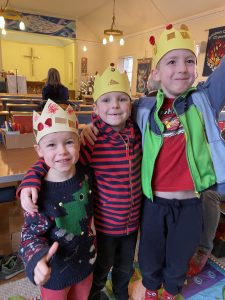 Epiphany 2025
Epiphany 2025
On Sunday we celebrated Epiphany and were delighted to have the presence of three young kings to join us.
St Matthew 2: 1–12
The word journey is often used in various contexts these days. Often its used to describe an experience. But all life is a journey and our life as Christians is a journey. We are all on a journey together.
Today, we celebrate the journey of the wise men in Bethlehem, marking their act of determination and perseverance in getting to see Jesus. But we wonder how they might have felt when they arrived at the stable. For they had travelled through the night many miles by camel following a star, to discover that the star had come to rest over a stable. They had followed a star and found a stable. Surely, they were expecting the new king to be born in a palace or at least a house. And we wonder how they must have felt as as they look down from some nearby Judean hill with the dawning realization that their destination was a stable!
Following stars and finding stables is a common occurrence in human experience. Who among us has not, at some time in our lives, fixed our gaze on some high and lofty star only to find it leads to a stable? It is better to travel hopefully than to arrive comes to mind.
All of us at some time in our life follow a star only to discover a stable.
The first thing we can say about the original wise men is that although they end up in a stable, they came looking for God. They came looking for the new King which the star they had studied led them to. And although the wise men ended up in a place that they did not expect, this did not stop them from making the most of it.
Often in life, when we are in a bad place we tend to think only of ourselves and how we can get ourselves out of the mess. We tend to rely on ourselves. And perhaps we often stop looking for God at all and for any good in our predicament.
But for the Wise men, the opposite was the case. Although they found themselves in a place they didn’t expect, they did not close their minds to God’s presence. In the end it didn’t matter that the King they had come to worship was living in a stable, because for them the star had led them to the truth: The truth that God had become human and was turning upside down the values of the world. The wise men had found God in the most unlikely place.
The second thing we can learn from the wise men is that they offer their best to God. As we all know they offer gifts of Gold, Frankincense, and Myrrh to the infant Christ. Gifts that were expensive and fit for Royalty.
But if one reads the account of the visitation of the wise men again, you will see that the offering of gifts is not the first thing they do. The first thing they do is to offer themselves in humble adoration and praise to the new born king.
Their first gift to the King of all creation is of themselves and this is ultimately the best gift anyone can offer to God most high. Every year when we sing the carol “In the Bleak mid winter” I am reminded of this ultimate gift, for in the last first we sing:
What can I give him, poor as I am?
If I were a shepherd I would bring a lamb;
If I were a wise man I would do my part,
Yet what I, can I give him: give my heart.
Christina Rossetti who wrote these words, knew all too well our human poverty and frailty, our desires and weaknesses, but she also knew that the greatest gift of all was of the self. Total and undivided giving of the self. When one first hears this one often thinks one should only offer up the best bits of oneself, the good bits, the bits that are worthy. But that’s not what it means. Offering of oneself means oneself in its entirety – good and bad alike.
And the third thing we can learn from the wise men is that this event marks a new direction, a new beginning in their lives. As we have heard and know from the Christmas narratives, the wise men first looked for Jesus in the palace of Herod. They expected him to be born in splendour and live in earthly glory. But this revelatory experience of seeing Jesus in a stable and not in a palace changed the mindset of the distant travellers. Herod had asked them to return to him with word as to where Jesus was, but they didn’t. They chose to travel home by another route.
